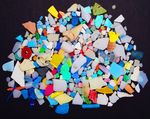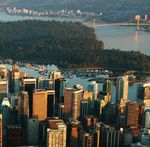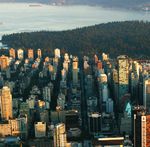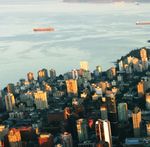Every litter bit hurts - GreenSeas Trust
←
→
Page content transcription
If your browser does not render page correctly, please read the page content below
THE BIG ISSUE
Every
litter
bit
hurts
The millions of tonnes
of rubbish that find their
way into the world’s seas
are having irreversible
effects on wildlife, writes
Fazilette Khan
01
When Samuel Coleridge wrote in The Rime last year. The first worldwide study of
of the Ancient Mariner, “Water, water, land-based plastic waste entering the oceans
everywhere / Nor any drop to drink”, he estimated that between 4.8 million and
was not thinking of the 5.25 trillion plastic 12.7 million tonnes ended up in the ocean in
particles floating in our oceans. But he 2010. A significant part of this debris comes
might today. from careless littering and the spread of
01 Schoolgirls Melati and Isabel Wijsen — campaigners to rid Bali
That unimaginable number was revealed rubbish by winds, drains and floods. of plastic bags by 2018 — at TEDGlobal London last year
in a European Environment Agency report Discarded cigarette butts of cellulose (Photograph: James Duncan Davidson/TED)THE BIG ISSUE
01
accidental discharging at sea are major
culprits too.
Then there are the shipping containers
filled with plastic products that go
overboard on a fairly regular basis. Who
can forget the 28,000 plastic ducks that
freed themselves from their container,
en route from China to the US. Or the Yong
Xin Jie 1, which lost seven 40ft containers
filled with sacks of small plastic pellets
south of Hong Kong in 2012.
Gone, too, are the days when exfoliants
contained crushed particles of apricot
kernels and walnut shells to cleanse your
skin. Instead, microbeads — bits of plastic
measuring less than 1mm that are too
small to be filtered by sewage-treatment
plants — are added. You’ll even find
microbeads in toothpaste.
These plastics break down when exposed
to the sun, tides, waves, oxidation and
biological activity to become microplastics
— particles measuring 1-5mm.
02
Mussels, barnacles, amphipods and
lugworms ingest these microplastics
acetate — a plastic thoughtlessly thrown (mainly polyvinylchloride, polyester and
down drains — drink containers and food polyamide), which account for 65% of
wrappings left on beaches and unwanted marine debris recorded.
plastics bags left to drift in the winds all Microplastics can get into mussels’
01 Boyan Slat, the 21-year-old Dutch poster boy for cleaning up our end up in waterways. circulatory systems and remain there for
seas, stands beside a pile of plastic collected by volunteers in
Hawaii (Photograph: The Ocean Cleanup)
They are, however, not the only source of more than 48 days. And the problem moves
02 Testing of Slat’s Ocean Cleanup Array concept plastic marine litter: discarded fishing up the food chain: fish have been found with
(Photograph: Erwin Zwart/The Ocean Cleanup) gear, illegal dumping by ships and fragments of microplastics in their guts.THE BIG ISSUE
Chemicals from plastics leach into the On a diving trip to Greece as a teenager,
water. Many of these pollutants, such as he encountered more plastic bags than fish.
PCBs and DDT, are known endocrine That inspired him to find a way to remove
disruptors and developmental toxicants. plastics from the sea, specifically in the
Exposure to these chemicals during North Pacific Subtropical Gyre, also known
pre-natal or early life can lead to as the Great Pacific Garbage Patch,
irreversible effects in wildlife and humans. between Hawaii and California, where so
Biodegradable plastics are not quite the much of the debris gathers.
holy grail you might expect, either. Slat has proposed a “passive clean-up”
For the plastic to break down, method, using an array of floating barriers
biodegradation requires microbial activity fixed to the seabed that catch the debris as
in an industrial waste composter where it flows past on the ocean currents. Once
the temperature reaches 70°C. If the bag is captured, the plastic can be mechanically
left on the beach or floats into the sea, it extracted.
will just become smaller particles of plastic A clean-up array underwent testing in an
03
and never decompose to its original offshore basin at the Maritime Research
elements. Institute Netherlands in October 2015 to
An online course on marine litter run by discover its operational limits and a first
the UN Environment Programme (UNEP), 2,000-metre version is projected to be
in co-operation with the Open University of deployed this year off the coast of
the Netherlands, provides an insight into Tsushima, an island between Japan and
the problem and useful tools to tackle it. South Korea.
A DPSIR (Driving Forces-Pressures- The aim is to scale up the arrays so that
State-Impacts-Responses) framework tool by 2020 a 100km system can be deployed Fazilette “Bobby” Khan is a trustee of GreenSeas Trust
gives decision makers a way to assess and to clean up about half the Great Pacific and a former seafarer who has taken the online course
analyse the complex interplay between Garbage Patch. on marine litter run by UNEP and the Open University of
societal and environmental factors. Not on the same scale but equally the Netherlands.
The degree course is highlighting valuable in terms of removing marine
inspiring examples of people and debris is Net-Works. In collaboration with
organisations playing a leading role in the Zoological Society of London, this
tackling this issue — from companies business model combines conservation and
making artwork from flip-flops retrieved on livelihood by enabling fishing communities
beaches, to two young sisters who, in developing countries to collect old and
disgusted with the amount of rubbish on discarded nets. This nylon is then used to
their Indonesian island of Bali, started a make carpet tiles.
campaign called Bye Bye Plastic Bags. There are many innovative ideas.
Another remarkable individual is Boyan Imagination and dedication are required to
Slat, founder and chief executive of the solve the global problem of plastics in the 03 Microplastics collected during a clean-up along just 22 metres
Ocean Cleanup Foundation. seas. of Oregon coastline (Photograph: Wolfram Burner)
Expand your operations to
ancouver, Canada.
vancouverimc.orgYou can also read



























































